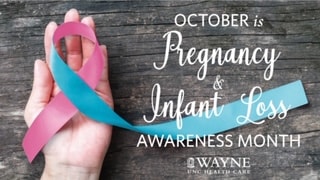Supporting Parents Who Have Experienced Loss

The days and months leading up to a new baby can be exciting for new parents. They paint and prepare their nursery, sign up for free literature and coupons from the diaper and formula companies. Their friends shower them with gifts to help ease their transition into parenting.
Then, the unthinkable happens – a complication -- and what once was a happy event suddenly becomes tragic.
Observed in October, Pregnancy and Infant Loss Awareness Month is a time to spread awareness of the needs of grieving parents and support them in honoring their babies. We sat down with Wayne UNC Health Care Director of Perinatal Services Susan Campbell and UNC Psychiatry at Goldsboro Physician Assistant Regina Gurley to discuss ways friends and loved ones can support parents who have experienced loss.
Grief is Different for Everyone
When a family experiences loss, it’s important to recognize that everyone experiences grief differently.
“They all go through the stages of grief, but the pace at which they go through each stage can be very different,” said Campbell. “Most are overwhelmed due to the unexpected occurrence.”
Young, child-bearing women often don’t think about the possibility of losing their baby after the first few months. Sometimes they receive this difficult news just prior to or in the midst of labor, and they have little or no time to process the loss.
“From a professional’s perspective, we have to meet our patients where they are,” said Gurley. “The process of experiencing grief is so unique and unpredictable that we even have conflicting opinions about how to address child loss amongst our own professional community.”
Gurley said she thinks this speaks to the importance of working with families on a case-by-case basis, noting that grief is not something with a set timeline or treatment plan.
It’s especially important for parents and family members also to understand this, since differences in the way they grieve can take a toll on the family and parenting unit, she said.
Signs of Grief
Parents and family members often will experience many symptoms that overlap with depression, such as intense sorrow, emotional pain, sleep disturbances and changes in appetite. But, in the context of bereavement, many symptoms are considered normal, said Gurley.
“Our guidelines classify so-called ‘complicated bereavement’ as experiencing intense symptoms following loss for more than 12 months, and to such a degree that the person experiences impairments in social, occupational or other important areas of functioning,” she said. “For example, if a mom or dad no longer has the motivation to care for other children in the home, it would certainly be time to reach out.”
Some other signs to watch for in parents or family members are self-injury or talk of ending their lives.
How You Can Help
If you’re a friend or family member of someone who has experienced loss, there are some things you can do to offer support.
“It’s important to understand that your friend or family member may still be trying to understand,” said Campbell. “Sometimes the best thing you can do is just be there and listen to them if they want to talk, or sit quietly and hold their hand.”
She also suggested avoiding making certain statements while a person is grieving and process. Comments like, “You can always try again,” “It’s God’s will,” “At least you know you can get pregnant,” or “At least you already have a child,” are well-meaning and may seem comforting, but they can be upsetting to someone who is dealing with loss.
“Being there for the friend or loved one through simple acts of service like mowing their grass, dropping off food or even just listening – and not necessarily responding – can be very helpful and help avoid unnecessary additional trauma,” said Gurley.
Healing from Loss
When it comes to healing from loss, parents have found different things helpful. “Some people like group involvement,” said Campbell. “Others don’t. I can say from personal experience that a support group was vital to overcoming my loss.”
Often parents – particularly mothers – find it helpful to talk to other women who have experienced similar loss, especially when the family has moved forward to a point where the mother feels unable to talk about the baby.
“It’s so important for mothers to talk about the experience,” Campbell said. “I think this heals those that need to talk things out. A support group can also show you that you aren’t alone and that others have experienced so many losses and have survived. You can, too.”
Gurley recommends exploring resources like Postpartum Support International, which provides a free resource connecting families with volunteers who come alongside individuals and help them locate resources within their own community.
“I believe we often underestimate the importance of community and relationships in so many situations, not just in overcoming grief,” she said. “Being alone actually incites worsening of depression and can significantly prolong healing.”
If you or someone you love has experienced pregnancy or infant loss and needs support, look for support from a local provider today, as well as these resources for support: